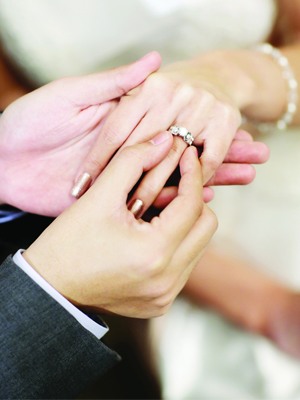A positive behaviour pattern can help you accomplish awesome things – making steady moves up your desired career ladder, enjoying fulfilling friendships, or maintaining a kick-ass relationship. A negative pattern can land you in a rut, making you feel like you’re running endlessly on a hamster wheel, getting nowhere. Nothing is more frustrating than the pattern you can’t wrench yourself out of.
If you’re in a relationship rut (whether this means continually finding yourself with a dead beat dude or perpetually sad and alone, etc), the culprit is likely an emotional blind spot. Meaning, the thing that deep down, you probably have an inkling of, but are refusing to accept. Boss lady Martha Beck (who writes fantastic self-help books and a column in Oprah's magazine) explains emotional blind spots like this:
"It isn’t the inability to perceive information but the astonishing ability to perceive information while automatically refusing to allow it into consciousness. Our minds don’t perform this trick without reason. We only “go blind” to information that is so troubling, so frightening, or so opposed to what we believe that to absorb it would shatter our view of ourselves and the world."
Ok, so, granted, it's just dating we're talking about here – there's no need to talk earth-shattering at the moment. But what Beck means is, we know what we're doing when we play our part in a toxic relationship pattern – because we watch ourselves do it. But there's a reason we don't acknowledge it. We're terrified of what might happen if we act another way.
For example, if you tend to end up in unfulfilling flings with men who are "not looking for a relationship," it could be that you're afraid of what might happen if you took a chance on a guy who actually was available, making it all the more risky for your heart and ego. Or, if you never talk to people at parties because you're certain you aren't charming enough, it's probably only because you're afraid your belief will be affirmed.
The thing is, what feels earth shattering in our minds is rarely ever such a big deal when we actually face it. It's sort of like how work can seem completely unmanageable on a Sunday night at 11 PM and you're lying in bed dreaming up all the stressful things that might happen. Or, the party you've been dreading is only totally terrifying until you get there.
The fears that brew in our minds are, a lot of the times, just bogey men. To shine a flashlight and do away with them, we've got to hunt them down and stare them in the face, good and proper. Beck urges those who are grappling with an emotional blind spot to do this by answering these three questions:
1. What am I afraid to know?
2. What's the one thing I least want to accept?
3. What do I sense without knowing?
Freewriting will help you work your way through these (that is, writing without stopping, even if you get distracted and start writing nonsense – just keep on going). If, when you answer these three questions, a hint of a realization comes to mind, you're on the right track. Don't start thinking too much about it though, just notice what you notice and don't worry about changing or forcig anything. All you have to do is let your realizations percolate.
If you want to kick this process up a knotch, Beck suggests, for a week, ask for blind-spot feedback from one person per day. A new person every time. Just say it: is there anything about me that I don't seem to see but is obvious to you? Obv, you should start this assignment with your nearest and dearest – sometimes constructive criticism can be tough to hear, even when you're seeking it and ready to handle it like a boss.
Bear in mind through, that surprisingly enough, strangers can identify blind spots just dandy-like. Just toss aside the vague, unhelpful, unactionable criticisms you might get (that goes for the ones you impose on yourself, too), and don't take anything too, too personal.
This is all in the name of building up positive belief system that leads to positive relationship patterns. It's totally worth it, because you are! And just in case you need a reminder: you don't have to settle for anything you don't truly, truly want.












